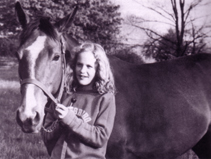Horses in Confinement
Pipe Corrals Everywhere
Some of the most wonderful animal lovers I know keep their horses in pipe corrals. Here in California, pipe corrals are everywhere. This consists of a very small area for horses to reside. There is land all around us, yet most of the horses have no pasture.
When I was growing up in New York, the law was an acre per horse. Now in New York it is seven acres for every ten horses.

I grew up on 14 acres, and we took care of eight horses. We had three large pastures, each of them different. The front field was a large, open, grassy field with a line of trees by the road and competition jumps that horses would often jump freely. One of the side pastures was a long grassy strip with a maze of maple trees. The other side pasture was a grassy, hilly field with a stream meandering through it and a tight forest where the horses would hide out on hot days.
Our horses rotated pastures doing the week and grazed with deer and bunnies. They slept in the barn at night. They always had other horses turned out with them. I don’t think they were ever bored.
Many horses here in my town in California do get turned out but into small, bare paddocks — with no trees, streams, hills, or brush to meander through — and even at that they have very little time outside. When the horses complain that they don’t get enough free time to run, I have heard many excuses by their humans. Some owners are worried the horses may hurt themselves, so they lunge their horses instead. Some are worried that they will not be able to be caught afterward. Others have no time. And many are worried about trying to give their horse a friend because they might fight.
Pipe corrals and little turnout is such a usual occurrence in my town that it surprises others how much this pains me. My heart literally aches when I drive by ranches. I usually either close my eyes, look away, or hold my breath; other times I take a deep breath and send them love and understanding for what they are missing.
Horses are athletes. They are designed to roam free. What have we done to them? I watch them move. They are so stiff. I hear many of them get cortisone injections in their legs to help them move more fluidly. When do they play? “When we go on trail rides,” their owners will answer. I question: “When are they free to explore and learn to be confident in their own bodies?”
My heart stabs with pains when I look into their eyes. I feel the worst for the ones that have been in pasture and then had it taken away.

I have a new friend. She is large horse, six years old, born on a 75-acre farm in Oregon. For four years of her life she roamed the pastures with her horse friends in the mornings, and in the afternoons was worked by her humans. Now she stands in a dirt 12-foot by 24-foot run, and gets turned out two days a week into a dirt arena. I watch her move. She is stiff and in pain. They shoot her legs with cortisone so she can jump. She hangs her head low and has the sad painful wrinkles around her eyes. She is depressed. They call her “lazy,” but I don’t blame them because they don’t know any better. They love her and have been taught by “experienced horse people” that this living situation is okay.
I ask this horse, “What do you have to say about this change in your life?” She replies, “The air is drier here, and even my breath does not give me much energy. It has been so long since I have felt the soft earth beneath my hooves or the taste of rich grass. My body feels different. My lower legs have a sharp shooting pain. It feels like the older horse from where I grew up. In the mornings it is hard to walk, and I have to pace around my run to get the blood flowing. I remember running so fast that the birds would play with us by flying beside us. That is what I miss the most about the fields, playing with the birds and the feeling of having a friend grazing beside me, his muzzle grabbing grass close to mine. I could listen to the sound of nature there and learn about what the direction of the wind means.
“I am down a canyon now, so the wind spins and it has no meaning. I hear nature, but it is not as lively — though the sound of a nearby creek and rustle of the trees give me pleasure. I enjoyed work more when I was younger, because my body felt well. I still love to learn, and I still love people. I just feel a longing for the open land and to be free. Some of the horses here know what I am talking about, and we will dream in our heads that we are out in the fields together.
“Some horses have no idea what we are talking about and say it sounds like a wonderful dream, and they too wish they could experience it. I realize I have fewer fears than they do, because I have known the country. The sounds of trucks make me nervous though, and I think it is because a huge truck took me away from my country home and brought me to a drier, more confined space. This is my life. I will live it and make the best of it, but I am not in joy most of the time, and often I pray that the big truck with a friendly face comes and takes me back home.”



